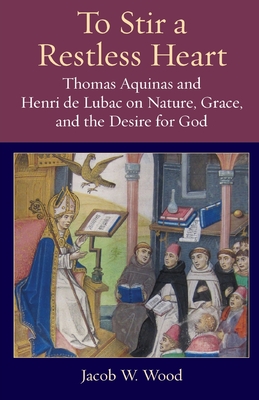To Stir a Restless Heart: Thomas Aquinas and Henri de Lubac on Nature, Grace, and the Desire for God

To Stir a Restless Heart: Thomas Aquinas and Henri de Lubac on Nature, Grace, and the Desire for God
To Stir a Restless Heart tells for the first time the story of how Thomas Aquinas conversed with his contemporaries about the dynamics of human nature's longing for God, and documents how he deliberately utilized Greek, Arabic, Hebrew, and Latin sources to develop a version of Aristotelian natural desire that was uniquely Augustinian: natural desire seeks the complete fulfillment of human nature "insofar as is possible," and so comes to rest in the highest end that God offers to it. Depending on whether God offers the free gift of grace to humanity, one and the same natural desire can come to rest in knowing God through creatures or seeing God directly.
Tracing the reception of Aquinas in the centuries that follow, Jacob Wood argues that Aquinas's student from among the Augustinian Hermits, Giles of Rome, consciously transformed Aquinas's understanding of human nature. By insisting that every nature has a positive aptitude for one, specific end, Giles tied our natural desire positively and directly to the vision of God, setting up a 700-year challenge among the Augustinian Hermits to explain the integrity of a nature with a supernatural end, as well as the gratuity of the grace which perfects it. Showing how de Lubac's early discovery of that tradition served as a principal source for his "natural desire for a supernatural end," To Stir a Restless Heart argues that many recent criticisms of de Lubac's theological anthropology find ready answers among the Augustinian Hermits, but that a renewed understanding of Aquinas's Augustinianism offers a more complete way forward: it preserves Aristotle's commitment to the integrity of human nature, de Lubac's commitment to the transcendence of human perfection, and Augustine's insistence on the priority and gratuity of divine grace in the work of redemption.
PRP: 356.49 Lei
Acesta este Pretul Recomandat de Producator. Pretul de vanzare al produsului este afisat mai jos.
320.84Lei
320.84Lei
356.49 LeiLivrare in 2-4 saptamani
Descrierea produsului
To Stir a Restless Heart tells for the first time the story of how Thomas Aquinas conversed with his contemporaries about the dynamics of human nature's longing for God, and documents how he deliberately utilized Greek, Arabic, Hebrew, and Latin sources to develop a version of Aristotelian natural desire that was uniquely Augustinian: natural desire seeks the complete fulfillment of human nature "insofar as is possible," and so comes to rest in the highest end that God offers to it. Depending on whether God offers the free gift of grace to humanity, one and the same natural desire can come to rest in knowing God through creatures or seeing God directly.
Tracing the reception of Aquinas in the centuries that follow, Jacob Wood argues that Aquinas's student from among the Augustinian Hermits, Giles of Rome, consciously transformed Aquinas's understanding of human nature. By insisting that every nature has a positive aptitude for one, specific end, Giles tied our natural desire positively and directly to the vision of God, setting up a 700-year challenge among the Augustinian Hermits to explain the integrity of a nature with a supernatural end, as well as the gratuity of the grace which perfects it. Showing how de Lubac's early discovery of that tradition served as a principal source for his "natural desire for a supernatural end," To Stir a Restless Heart argues that many recent criticisms of de Lubac's theological anthropology find ready answers among the Augustinian Hermits, but that a renewed understanding of Aquinas's Augustinianism offers a more complete way forward: it preserves Aristotle's commitment to the integrity of human nature, de Lubac's commitment to the transcendence of human perfection, and Augustine's insistence on the priority and gratuity of divine grace in the work of redemption.
Detaliile produsului








